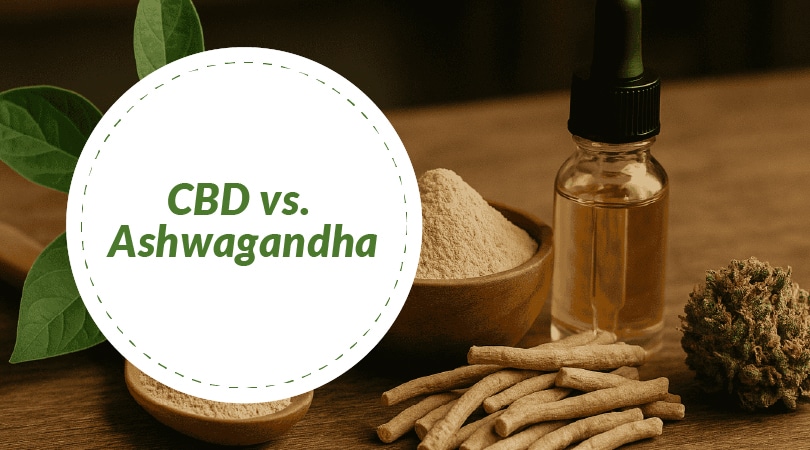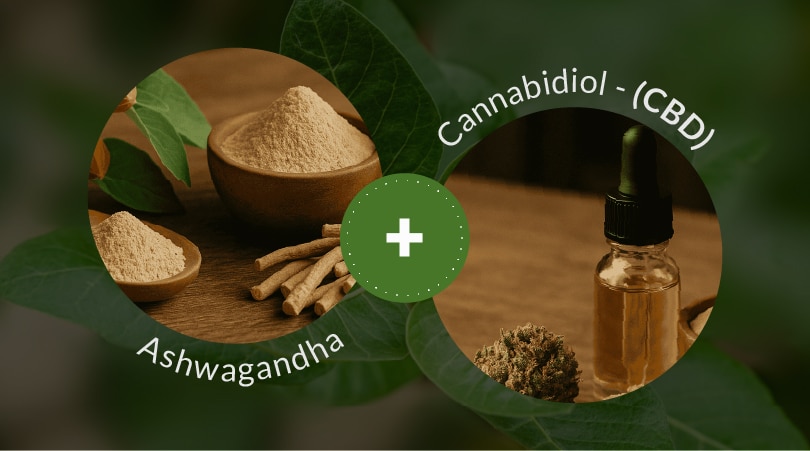
CBD vs. Ashwagandha: Comparing Two Natural Remedies for Stress
Sometimes, life can feel overwhelming. Work, relationships, and daily responsibilities, among others, inevitably bring stress to everyone. That’s why more people are turning to natural solutions to manage stress. Two of the most popular options, currently, are CBD and Ashwagandha, which are known for their calming effects. But how similar or different are they, and which one is right for you?
In this guide, we compare these two popular plant-based remedies to help you make an informed choice.
What Is CBD?
CBD, short for cannabidiol, is a natural compound found in hemp. Unlike THC, it is not psychoactive, meaning that it won’t get you high. Instead, many people use it to manage chronic pain, support relaxation, emotional balance, and sleep, among many others. CBD works by interacting with the body’s endocannabinoid system (ECS), which helps regulate mood, stress, and inflammation.
From CBD oils to CBD topicals, CBD products come in a wide range of forms — making it easy to incorporate into your daily wellness routine.
What Is Ashwagandha?
Ashwagandha is an adaptogenic herb that’s been used in Ayurvedic medicine (a traditional system of Medicine from India) for over 3,000 years. Ashwagandha is best known for helping the body adapt to physical and mental stress. It works by helping regulate cortisol, the body’s primary stress hormone.
Many people use it to support energy, mental clarity, and emotional resilience. It’s commonly found in capsules, powders, or tinctures.

How CBD and Ashwagandha Work in the Body
CBD and Ashwagandha work differently, although both aim to calm the mind and support a balanced nervous system.
- CBD interacts with the endocannabinoid system, helping to regulate neurotransmitters like serotonin and GABA (gamma-aminobutyric acid). This tends to promote a sense of calm and reduce stress responses.
- Ashwagandha acts on the HPA axis (hypothalamic-pituitary-adrenal axis), which controls the body’s reaction to stress. It helps to reduce elevated cortisol levels, which is key when you’re dealing with chronic tension or fatigue.
What Research Says
While current research is still scant, existing studies are promising:
- CBD has been studied for its role in reducing anxiety and improving sleep. Some research shows that CBD may help reduce heart rate and stress in social situations.
- Ashwagandha has shown potential in lowering cortisol, improving mood, and reducing symptoms of anxiety and depression. In some studies, daily intake helped reduce stress markers by over 30%.
CBD vs. Ashwagandha: Key Differences
| Feature | CBD | Ashwagandha |
| Source | Hemp plant | Root of Withania somnifera |
| Key Benefit | Calms the nervous system | Regulates cortisol levels |
| Onset of Effects | Fast (minutes to hours) | Gradual (days to weeks) |
| Psychoactive? | No | No |
| Common Forms | Tinctures, topicals, gummies | Capsules, powders, teas |
| Works Best For | Quick relief from stress/anxiety | Long-term stress adaptation |
| Legal Status | Legal as long as it doesn’t exceed 0.3% THC | Legal |
Which One Should You Choose?
Deciding whether to take CBD or Ashwagandha depends on your specific needs.
- Choose CBD if you want:
- Fast relief from occasional anxiety
- Better sleep after stressful days
- Support during high-pressure situations
- Quick relief from chronic pain
- Choose Ashwagandha if you need:
- Daily support for chronic stress
- Help with fatigue, burnout, or mood swings
- A more gradual approach to emotional balance
Can You Take CBD and Ashwagandha Together?
Yes — and many people do. Since CBD and Ashwagandha work through different pathways, combining them might lead to each of them complementing the other. That said, if you’re taking other medications or managing a health condition, you should always talk to your doctor first.

Final Thoughts
Both CBD and Ashwagandha offer unique benefits for stress management. Whether you’re looking for fast-acting relief or long-term support, choosing the right option depends on your body, lifestyle, goals, and, ultimately, personal preference. Some people stick to one, others use both — there’s no one-size-fits-all answer.
When trying something new, always start slow and pay attention to how your body responds (check out our CBD dosage guide for beginners). And make sure you’re buying high-quality, third-party tested supplements.
If you’re looking for CBD, look into our full-spectrum CBD oils and salves, which are third-party tested to ensure the highest quality.
FAQs
Can I take CBD and Ashwagandha at the same time?
Yes, you can take both together, and many people do. However, check with your healthcare provider if you’re taking other medications.
Which one is better for sleep?
CBD is typically more effective for sleep issues due to its calming effects. Ashwagandha may help over time by reducing overall stress levels.
Are there side effects to CBD or Ashwagandha?
There are no known side effects for CBD, although very rarely, some might have a dry mouth. On the other hand, Ashwagandha can occasionally cause stomach upset. However, both are generally well-tolerated.
References
National Institutes of Health, Office of Dietary Supplements. Ashwagandha: Is it helpful for stress, anxiety, or sleep? NIH Office of Dietary Supplements. Updated May 2025. https://ods.od.nih.gov/factsheets/Ashwagandha-HealthProfessional/
Lopresti AL, Smith SJ, Malvi H, Kodgule R. An investigation into the stress-relieving and pharmacological actions of an ashwagandha (Withania somnifera) extract: A randomized, double-blind, placebo-controlled study. Medicine (Baltimore). 2019 Sep;98(37):e17186. doi: 10.1097/MD.0000000000017186. PMID: 31517876; PMCID: PMC6750292.
Faraj M, Dautrich T, Lundahl L, Marusak H. Effects of two cannabidiol oil products on self-reported stress relief: A quasi-experimental study. Med Cannabis Cannabinoids. 2023 Nov;6(1):138-147. doi: 10.1159/000531886. PMID: 37942294; PMCID: PMC10629851.
